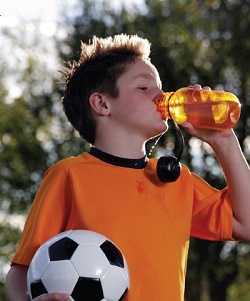 During the hottest months of the year, when outdoor activity is at its peak, countless incidents can send anyone to their nearest emergency department.
During the hottest months of the year, when outdoor activity is at its peak, countless incidents can send anyone to their nearest emergency department.
With that, Dr. Richard Reidy, an emergency medicine physician at McLaren Macomb, sees a disproportionately higher occurrence of certain maladies among active youth.
With fall sports practice starting soon in these hot months ahead, Dr. Reidy offers his expert advice on the most common, serious conditions:
Dehydration
"Thirst might actually occur later when it comes to dehydration symptoms. Initial symptoms include fatigue, weakness and lightheadedness.
"The best prevention is always ensuring you're adequately hydrated before any activity or physical exertion. If symptoms do start to appear, increase fluid consumption and seek out a cooler environment."
Head injuries
"Kids and parents should be concerned if a blow to the head results in any changes to neurological functions, such as insomnia, amnesia, dizziness, lightheadedness or loss of consciousness and should immediately seek an evaluation in an emergency department.
"Prevention is key "“ such as a properly fitted helmet during activities. However, minor head injuries are quite common and do not result in permanent effects."
Heat illness
"Heat illness is a continuum, and a patient is diagnosed with heat stroke only with a core temperature greater than 104 degrees with a mental status change, such as a throbbing headache, dizziness, lightheadedness with nausea and vomiting.
"Additional symptoms could be hot, dry skin with a lack of sweat despite the heat, muscle cramps, weakness, shallow breathing and rapid heartbeat. With this being an emergent condition, seek immediate rapid cooling in an emergency department setting."
Learn more about emergency services at McLaren Macomb at mclaren.org/macomber.